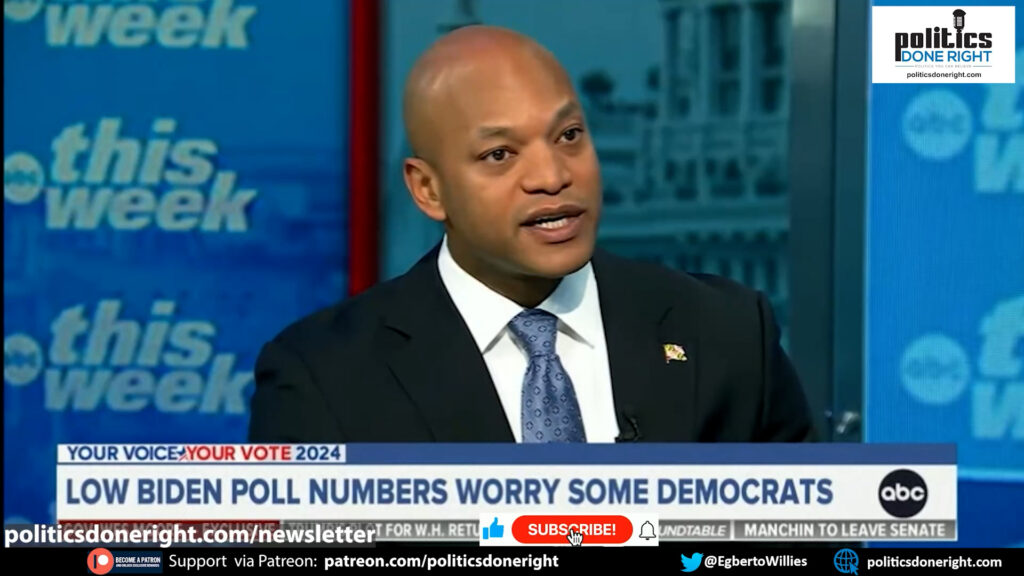Maryland Governor Wes Moore warns Joe Manchin not to tarnish his legacy by running as a spoiler. Moore missed the opportunity to blame Manchin for the return, poverty, and Biden’s Israel mistake. He then slams No Labels.
Maryland Gov. Wes Moore warns Manchin.
The political landscape is ever-evolving, and new challenges and strategic decisions come to the fore with each election cycle. The recent comments by Maryland Governor Wes Moore offer a poignant insight into the current state of Democratic politics and the potential pitfalls of individual ambitions that could disrupt collective progress. Moore’s words to Senator Joe Manchin underscore a broader conversation about legacy, efficacy, and the strategic imperatives of the Democratic Party.
- Maryland Governor Wes Moore advised Senator Joe Manchin against a third-party presidential run, suggesting it could damage his legacy.
- Moore criticized the No Labels movement, which Manchin is considering for a run, as lacking a clear plan, policy platform, and transparency, mainly being a vehicle of dark money.
- Moore expressed confidence in President Biden’s ability to show results over rhetoric, contrasting this with what he views as the ineffectiveness of third-party candidacies.
- He acknowledged President Biden’s accomplishments but also pointed out that some progress has been reversed due to Manchin’s resistance to progressive policies.
- Biden must be warned of the potential political repercussions of his Middle East policies, which could alienate young voters and people of color, possibly leading to voter apathy.
Governor Moore’s warning to Senator Manchin about a third-party run is more than just advice; it is a strategic plea rooted in historical context. Third-party candidacies in the United States have often been criticized for their potential to act as spoilers in closely fought elections. By advising against such an action, Moore is implicitly highlighting the importance of unity within the Democratic Party, especially at a time when the margins in both Houses of Congress are razor-thin. The legacy of a politician is often defined by their ability to effect change within the system, and a third-party run, which could be seen as a vanity project in the absence of a viable path to victory, will tarnish Manchin’s years of service.
The criticism of the No Labels movement as a “configuration made up of dark money” by Moore is particularly scathing, bringing to light the often opaque financing mechanisms behind political movements. The integrity of political processes is a cornerstone of democratic values, and the involvement of dark money undermines public trust. When politicians are perceived as being in the pockets of undisclosed donors, it erodes the fundamental belief in a government “of the people, by the people, for the people.”
Moore’s commendation of President Biden’s results-oriented approach is an indirect critique of Manchin’s resistance to the progressive policies that have defined the early part of Biden’s presidency. The implication here is that progress, particularly in the realm of economic recovery and infrastructure, has been stymied by intra-party disagreements, with Manchin at the center. It’s a reminder that progress in governance is often a collective effort, and when individual actors obstruct the process, it can have far-reaching consequences for the party and the nation.
Governor Moore’s reflection on the state of the economy and social support systems post-pandemic further illustrates the complex interplay between policy, support, and economic health. The assertion that the decline in progress and increase in poverty can be partly attributed to Manchin’s actions is a critical examination of the responsibility elected officials have to their constituents. Manchin implies that tagging to the center is the answer. However, his tag to the center as he refused to continue subsidies to the poor and middle class provably brought back child poverty with a vengeance.
In an increasingly interconnected world, the foreign policy stances of U.S. leaders can have significant implications for their support at home, particularly among younger generations and minority communities who may have a more global perspective and access to diverse sources of information. Biden’s embrace of Bibi Netanyahu will cost him the votes of the young, Palestinians, Arabs, and more.
IGovernor Wes Moore’s admonitions to Senator Manchin carry weight beyond a simple warning; they are emblematic of the delicate balance required in political strategy and the pursuit of a legacy that aligns with the broader aspirations of the Democratic Party and the nation. The conversation between legacy, efficacy, and unity is one that will continue to define the contours of American politics as it strides towards future elections and the ongoing quest for progress and stability.
Viewers are encouraged to subscribe and join the conversation for more insightful commentary and to support progressive messages. Together, we can populate the internet with progressive messages that represent the true aspirations of most Americans.

